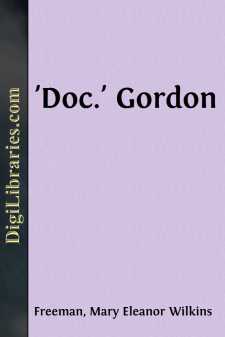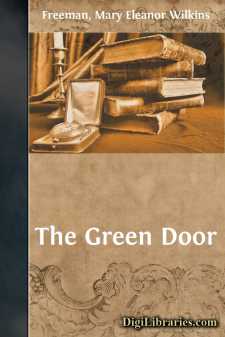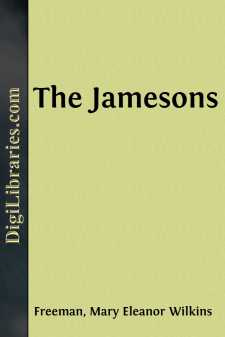Categories
- Antiques & Collectibles 13
- Architecture 36
- Art 48
- Bibles 22
- Biography & Autobiography 813
- Body, Mind & Spirit 142
- Business & Economics 28
- Children's Books 17
- Children's Fiction 14
- Computers 4
- Cooking 94
- Crafts & Hobbies 4
- Drama 346
- Education 46
- Family & Relationships 57
- Fiction 11829
- Games 19
- Gardening 17
- Health & Fitness 34
- History 1377
- House & Home 1
- Humor 147
- Juvenile Fiction 1873
- Juvenile Nonfiction 202
- Language Arts & Disciplines 88
- Law 16
- Literary Collections 686
- Literary Criticism 179
- Mathematics 13
- Medical 41
- Music 40
- Nature 179
- Non-Classifiable 1768
- Performing Arts 7
- Periodicals 1453
- Philosophy 64
- Photography 2
- Poetry 896
- Political Science 203
- Psychology 42
- Reference 154
- Religion 513
- Science 126
- Self-Help 84
- Social Science 81
- Sports & Recreation 34
- Study Aids 3
- Technology & Engineering 59
- Transportation 23
- Travel 463
- True Crime 29
Mary Eleanor Wilkins Freeman
Mary Eleanor Wilkins Freeman was a prominent American author known for her novels and short stories depicting New England village life in the late 19th and early 20th centuries. Her works often explored themes of female independence and the social dynamics within small communities, with notable pieces including "A New England Nun" and "The Revolt of 'Mother'." Freeman's writing earned her significant recognition, and she was one of the first women to be inducted into the National Institute of Arts and Letters.
Author's Books:
Sort by:
Chapter I “We,” said Mrs. Solomon Black with weighty emphasis, “are going to get up a church fair and raise that money, and we are going to pay your salary. We can't stand it another minute. We had better run in debt to the butcher and baker than to the Lord.” Wesley Elliot regarded her gloomily. “I never liked the idea of church fairs very well,” he returned hesitatingly. “It has...
more...
I This Indenture Wittnesseth, That I Margaret Burjust of Boston, in the County of Suffolk and Province of the Massachusetts Bay in New England. Have placed, and by these presents do place and bind out my only Daughter whose name is Ann Ginnins to be an Apprentice unto Samuel Wales and his wife of Braintree in the County afores:, Blacksmith. To them and their Heirs and with them the s: Samuel Wales, his...
more...
Chapter I Banbridge lies near enough to the great City to perceive after nightfall, along the southern horizon, the amalgamated glow of its multitudinous eyes of electric fire. In the daytime the smoke of its mighty breathing, in its race of progress and civilization, darkens the southern sky. The trains of great railroad systems speed between Banbridge and the City. Half the male population of...
more...
CHAPTER I It was very early in the morning, it was scarcely dawn, when the young man started upon a walk of twenty-five miles to reach Alton, where he was to be assistant to the one physician in the place, Doctor Thomas Gordon, or as he was familiarly called, "Doc." Gordon. The young man's name was James Elliot. He had just graduated, and this was to be his first experience in the practice...
more...
On the south a high arbor-vitæ hedge separated Evelina's garden from the road. The hedge was so high that when the school-children lagged by, and the secrets behind it fired them with more curiosity than those between their battered book covers, the tallest of them by stretching up on tiptoe could not peer over. And so they were driven to childish engineering feats, and would set to work and pick...
more...
Act I. Scene I.—Salem Village. Living-room in Giles Corey's house. Olive Corey is spinning. Nancy Fox, the old servant, sits in the fireplace paring apples. Little Phœbe Morse, on a stool beside her, is knitting a stocking. Phœbe (starting). What is that? Oh, Olive, what is that? Nancy. Yes, what is that? Massy, what a clatter! Olive (spinning). I heard naught. Be not so foolish, child. And...
more...
Letitia lived in the same house where her grandmother and her great-grandmother had lived and died. Her own parents died when she was very young, and she had come there to live with her Great-aunt Peggy. Her Great-aunt Peggy was her grandfather's sister, and was a very old woman. However, she was very active and bright, and good company for Letitia. That was fortunate, because there were no little...
more...
Chapter I Henry Whitman was walking home from the shop in the April afternoon. The spring was very early that year. The meadows were quite green, and in the damp hollows the green assumed a violet tinge—sometimes from violets themselves, sometimes from the shadows. The trees already showed shadows as of a multitude of bird wings; the peach-trees stood aloof in rosy nimbuses, and the cherry-trees were...
more...
ITHEY ARRIVE Until that summer nobody in our village had ever taken boarders. There had been no real necessity for it, and we had always been rather proud of the fact. While we were certainly not rich—there was not one positively rich family among us—we were comfortably provided with all the necessities of life. We did not need to open our houses, and our closets, and our bureau drawers, and give...
more...
Chapter I Amanda Pratt's cottage-house was raised upon two banks above the road-level. Here and there the banks showed irregular patches of yellow-green, where a little milky-stemmed plant grew. It had come up every spring since Amanda could remember. There was a great pink-lined shell on each side of the front door-step, and the path down over the banks to the road was bordered with smaller...
more...











